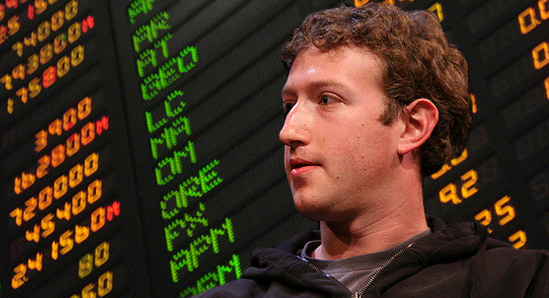 Facebook创始人马克•扎克伯格将从Facebook上市中筹得10亿美元,但他计划把这些钱当作税收上交给美国政府。
Facebook创始人马克•扎克伯格将从Facebook上市中筹得10亿美元,但他计划把这些钱当作税收上交给美国政府。
但愿马克•扎克伯格的衣兜够大,装得下这么多钱。
Facebook的CEO马克•扎克伯格计划在这个月末IPO时卖掉公司社交网络股票中的3020万股。如果股票的公开发行价在每股28美元到35美元之间,那么扎克伯格将一举把11亿美金收入囊中。
然而,这些钱大部分会直接流入美国政府和加利福尼亚州。扎克伯格想借此尝试通过一次重大的股票计划,他将把几乎筹来的所有现金当作税收上交。
但是,即使把这些钱当作税收交给政府,扎克伯格也会成为名义上的亿万富翁。一旦Facebook的公开发行价触顶,剩下的5亿400万股票将让他的身价直接飙升至176亿美元,按照福布斯的统计规则,扎克伯格将成为世界上最富有的50个人之一。彭博社甚至已经在它们的亿万富翁衡量指标中为他加了重重一笔。
那一天将成为Facebook的CEO有史以来赚的最多的一天,尽管他这几年已经赚得够多了。去年,扎克伯格的薪水有483,000美元,奖金达220,500美元,同时他还享有私人飞机旅游的额外津贴,价值达783,000美元。
因为Facebook的上市将大赚一笔的人不止扎克伯格一个。
投资人Peter Thiel在Facebook第一次夏季运作中投入了50万美元,现在他拥有该公司2.5%的股权。他计划在Facebook IPO当天售出所持有的大部分股票,如果以每股35美元计算的话,那将是价值2亿7100万美元的一笔数目。
Accel Partners是为Facebook融资的第一个重要风险投资家,拥有该公司11%的股权。他于2005年4月给Facebook投资了1270万美元,现在如果按他的计划把所持股票转手售出,他将获得13亿美元的现金。这次转手的收益的确不错!
俄罗斯风投机构DST Global持有Facebook 5%的股权,它将在IPO当天售出价值9亿1900万美元的股票;俄罗斯社交网络公司Mail.ru Group也将在那一天售出最高价值达3亿9200万美元的股票。
但是,Facebook那些关键的股东不会在IPO当天出售任何股票。这家社交网络公司的第二把交椅Sheryl Sandberg女士称她将继续持有手中的股票,这将让她成为名义上的亿万富翁。Facebook的另一位联合创始人Dustin Moskovitz也是如此,他是该公司的第三大股东。他所持有的8%股权在IPO当天的价值将达47亿美元,但他到时候应该不会出手。
Facebook最新交给监管部门的文件显示,Facebook已经与它的俄罗斯股东于上个月私下达成更为宽松的“锁定协议”,商定届时听到指令后这些股东才能开始出售手中持有的股票。
Mail.ru 和 DST公司可以在3个月以后出售其持有的约四分之一股票,7个月后再出售八分之一,1年之后便可以把剩下的股票完全出手。
而Facebook之前曾强制规定这两家公司在二级市场发售股票之前必须要等够6个月时间,并要求它们18个月以后才能完全出售手中持有的股票。
Facebook founder Mark Zuckerberg will collect $1 billion from Facebook's IPO, but he plans to hand almost all of it over to Uncle Sam to pay his taxes.
Let's hope Mark Zuckerberg has deep pockets in his hoodie.
The Facebook CEO plans to sell 30.2 million shares of his stake in the social network when it publicly offers its stock later this month. If the company's IPO prices at the top of its $28 to $35 per-share range, Zuckerberg would pocket a "cool" $1.1 billion.
However, most of that cash will go straight to Uncle Sam and California. Zuckerberg plans to partially exercise a major stock options grant, and will use almost all of the cash he raises from his IPO sale to pay off the taxes on that maneuver.
But even after the tax man takes his bite, Zuckerberg will be a paper billionaire. His remaining 504 million shares will make him worth $17.6 billion if Facebook hits the top of its IPO range -- enough to make him one of the 50 richest people on the planet, by Forbes' calculation. Bloomberg has already give him a spot in its Billionaires Index.
It will be the Facebook CEO's biggest payday by far, though he has collected plenty of cash over the years. Last year, he made $483,000 in salary, took home a $220,500 bonus, and received additional perks like private jet travel valued at $783,000.
Zuckerberg isn't the only one making gobs of money on Facebook's IPO.
Investor Peter Thiel, who put up $500,000 to get Facebook through its first summer of operations, now owns a 2.5% stake in the company. He plans to sell a chunk of stock on IPO day that could be valued at $271 million, assuming a $35 per share pricing.
Accel Partners, the first major venture capitalist to fund Facebook, owns around 11% of the company. It invested $12.7 million in April 2005, and plans to raise $1.3 billion in cash through share sales. Not a bad turnaround.
The Russian venture capital group DST Global, with its 5% stake, plans to sell $919 million worth of shares on IPO day, and Russian social network company Mail.ru Group will sell shares valued at up to $392 million.
But some high-profile Facebook shareholders won't be selling any of their stock on IPO day.
The social network's No. 2, Sheryl Sandberg, is hanging on to all of her stake, which will make her a paper billionaire. Same for Facebook co-founder Dustin Moskovitz, who has the third-largest ownership holding in the company. His 8% stake could be worth roughly $4.7 billion on IPO day, and he's not cashing out yet.
Facebook's latest regulatory filing suggests that the company's Russian investors worked some backroom deals with the social network last month, negotiating more lenient "lock-up agreements," which dictate when investors can sell off their holdings.
Mail.ru and DST can now sell roughly a quarter of their shares after three months, another eighth after seven months and the rest after a year.
Facebook's previous filings mandated a six-month waiting period before the pair could make any post-IPO share sales, and required them to wait 18 months before entirely unloading their holdings.
 Facebook创始人马克•扎克伯格将从Facebook上市中筹得10亿美元,但他计划把这些钱当作税收上交给美国政府。
Facebook创始人马克•扎克伯格将从Facebook上市中筹得10亿美元,但他计划把这些钱当作税收上交给美国政府。
